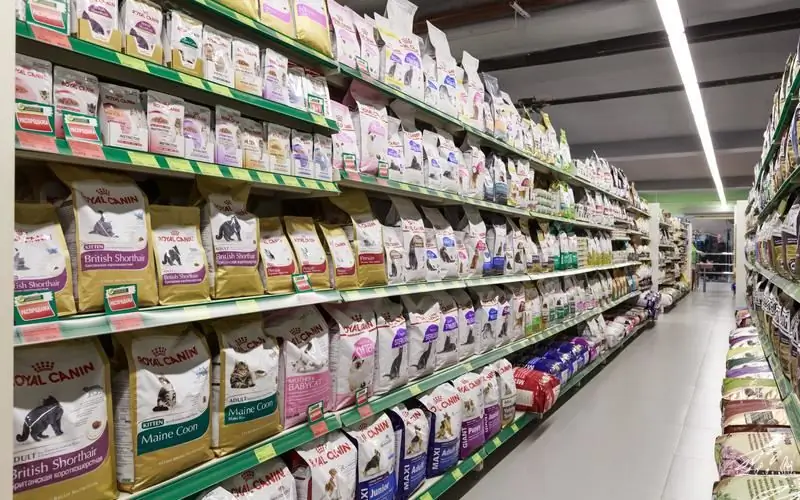
Table of contents:
- Author Bailey Albertson albertson@usefultipsdiy.com.
- Public 2023-12-17 12:53.
- Last modified 2025-06-01 07:32.
Varieties of ready-made cat food
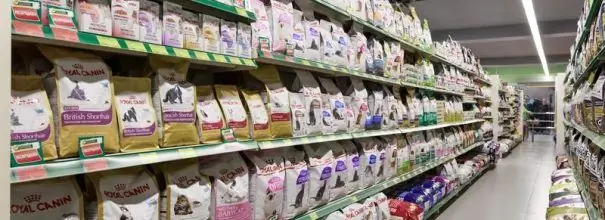
The range of ready-to-eat cat food is so wide that it's easy to get lost in it. For example, inexperienced animal owners often perceive premium rations as the best quality, although in reality they are not much better than the economy category. Many products are not intended for healthy cats and regular nutrition, because due to the nature of the composition, they can harm the pet. It is important to learn to understand the types of feed so as not to provoke the development of chronic diseases in the animal.
Content
-
1 Types of feeds according to daily needs
- 1.1 Complete feed
- 1.2 Incomplete feed
-
2 Types of feed by consistency
- 2.1 Dry food
- 2.2 Wet food
- 2.3 Canned food
- 2.4 Pate
-
3 Classification of feed
- 3.1 Economy class
- 3.2 Premium class
- 3.3 Super premium
- 3.4 Holistic class
-
4 Types of food depending on the age of the animal
- 4.1 Food for kittens
- 4.2 Food for adult cats
- 4.3 Food for senior cats
- 5 Preventive prepared feed
- 6 Medicinal ready-made feed
- 7 Other types of feed
Types of feeds according to daily needs
Depending on the presence or absence of a complete set of vitamins, minerals and amino acids in the feed, feed is divided into complete and incomplete feed. This is the first factor that should be considered when choosing, since not all foods are suitable for a systematic diet.
Complete feed
The composition of complete feeds already includes vitamin-mineral complexes and amino acids in pure form or ingredients that contain them. With this diet, pets should not be supplemented with supplements unless prescribed by a veterinarian. This can lead to hypervitaminosis.
It is possible to understand whether the feed is a complete food by the marks that the manufacturer left on the package. Usually the company notes this fact. If there is no information on this, you need to look into the composition. In super-premium feeds and below, individual vitamin and mineral complexes are most often present. They can be listed in the composition as "premix". It is rarely possible to find such names in holistics: they are replaced by additives in the form of herbs, vegetables, fruits, etc. The list of ingredients in such cases is rather long and varied.
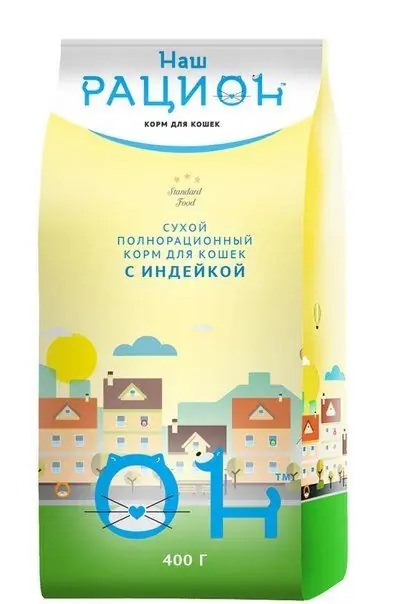
Balanced feed packages often have the word "complete"
The presence of nutrients is one of the main criteria when choosing a feed. If the animal does not have enough vitamins and minerals, it will begin to develop generalized diseases of the internal organs. For example, when my friend was feeding a month old kitten with canned food and treats, he subsequently developed rickets and pancreatitis. The latter arose, most likely, due to malnutrition and a sharp transition to adult products, but the deficiency of nutrients also played a role: with a lack of vitamins and minerals, tissue regeneration slows down, the body's ability to suppress inflammation worsens, and metabolic disorders occur.
Incomplete feed
Incomplete feeds can only be used as a treat, since they do not contain the entire range of essential substances. These are usually super premium wet rations or higher. They contain meat and broth, but no additional additives. Sometimes you can come across incomplete dry food. They are dried pieces of meat, snacks, etc.
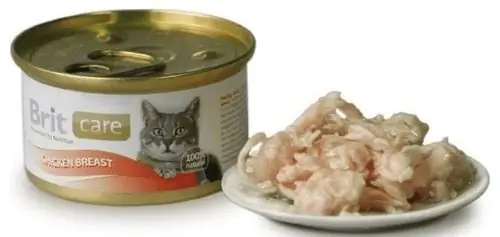
Incomplete feeds include Brit canned food: for example, Brit Care Chicken Breast contains only chicken breast and rice
Depending on the consistency, the treat can be added to the main portion of food or given separately from the main meals. It is not recommended to mix products with different textures. When eating dry food, pates and pressed pieces of meat in jelly must be given separately, since this can provoke indigestion, but dehydrated treats can be added. With a natural menu and a diet on wet prepared rations, the recommendations are reversed.
Types of feed by consistency
There are many types of feed consistency. To attract the attention of buyers, manufacturers produce pillows with soft filling, jelly with granular toppings, etc. The main types are 4 types: classic wet and granular food, as well as pate and canned food.
Dry food
Dry food is the most popular variety. Their consistency and cooking technology allow you to add a variety of additives to the composition: plant and animal extracts, vegetables, fruits, cartilage, offal, etc. This makes these feeds the most balanced. In most cases, they are suitable for the daily diet in terms of meeting the nutritional needs, but much depends on the diet class.
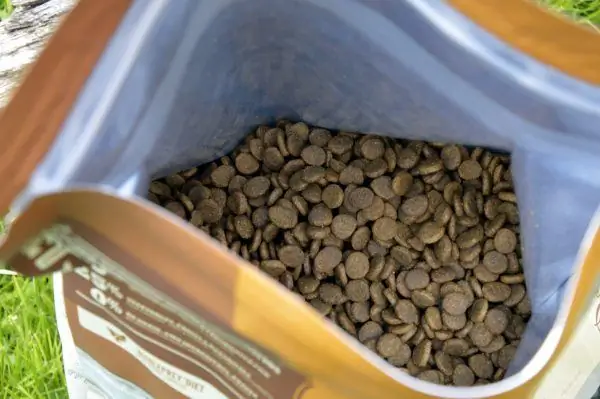
Ideally, dry food pellets should be dark because of the meat and slightly oily.
The advantages of this variety include ease of storage. In a sealed package, feed can remain usable for 2-3 years. After opening the package, the shelf life is sharply reduced to 4-8 weeks. This is only true when properly stored in sealed containers. If the packaging does not have a zip fastener, oils can quickly turn rancid. I had to deal with this when I bought large bags of food in order to save. I have only 2 cats living at home, so they do not have time to eat 12 kg per month. If the food goes rancid, the pets begin to refuse food. This must be taken into account when choosing a package.
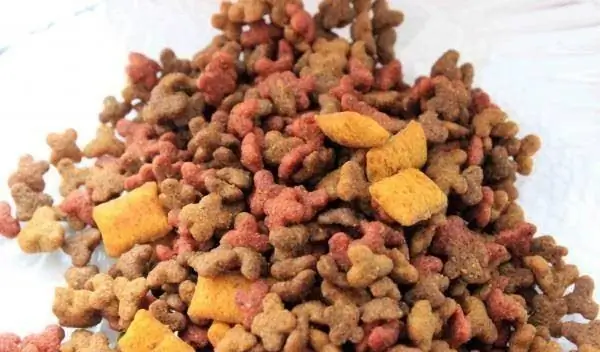
The presence of dyes in granules is not encouraged: they can irritate the mucous membranes of the gastrointestinal tract and have no nutritional value
The key disadvantage of dry food is low moisture levels. Because of this, unaccustomed animals can refuse to eat with a sharp translation. With a predisposition to diseases of the genitourinary system and gastrointestinal tract, as well as non-compliance with the drinking regime, the risk of developing pathologies increases. This is most dangerous for neutered and neutered animals, which often develop calculi in the kidneys and bladder.
Wet food
Wet foods are more meat-like in texture, so they are often used as a supplement to the main diet for natural foods. The disadvantage of this variety is its poor composition: due to the conditional restrictions imposed by the production technology, most often only meat, fish and broth are present in the list of ingredients. Cereals and processed vegetable products can be added to cheap feed. Good quality diets include small amounts of fruit.
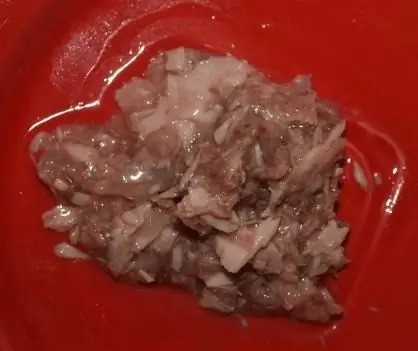
It is highly recommended to prefer foods with a meat-like appearance.
The shelf life of wet feed is much shorter. After opening the package, the animal must eat the contents within 1-2 days. The maximum shelf life is only possible in a sealed glass container. If the food is left in a standard pouch, it will spoil faster.
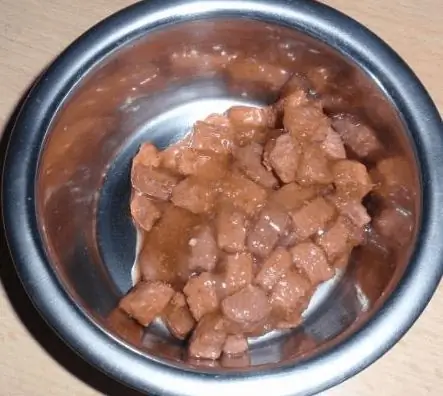
Dense thickening jelly, unnatural color and lack of texture familiar to meat are signs of poor wet food
Wet food is rarely complete. Vitamins and minerals are added to economy class products, but this does not improve quality. It is also not recommended to use wet food for regular feeding due to its consistency. The increased water content and soft pieces without hard fibers are ideal in cases of indigestion, rehabilitation after surgery and diseases of the genitourinary system. However, with prolonged use of softened food, the animal's paraanal glands may become inflamed. My friend's cat began to clog the bags after six months of feeding with wet food. Despite the normalization of the diet and the consistency of feces, exacerbations still worry him.
Canned food
Canned food can be conditionally called a subspecies of wet food. The key difference lies in storage containers: if standard wet food is packaged in pouches, then in this case metal cans are used.
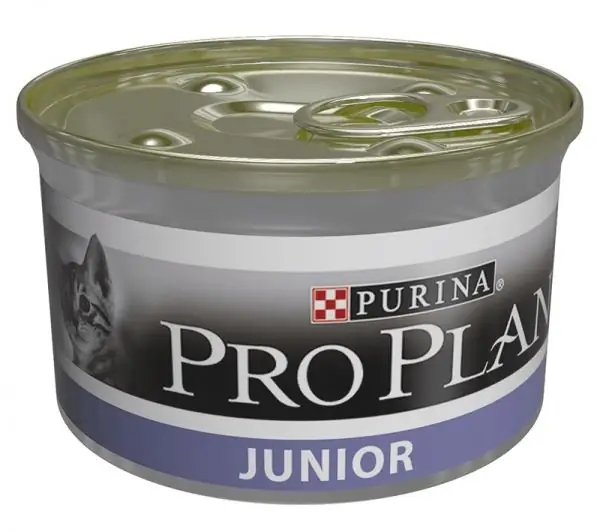
Banks are often equipped with a special ring for easy opening.
Canned food usually weighs more, so the contents can be divided into several portions. However, after opening the can, the shelf life is sharply reduced to 12 hours due to the increased oxidation of the metal. You can extend the period up to 1-2 days using glass containers.
Pate
Pate is another subspecies of wet food. It has a softer consistency and a uniform texture. Pates are not recommended to be given to animals on an ongoing basis due to the increased risk of indigestion and inflammation of the paranal glands.
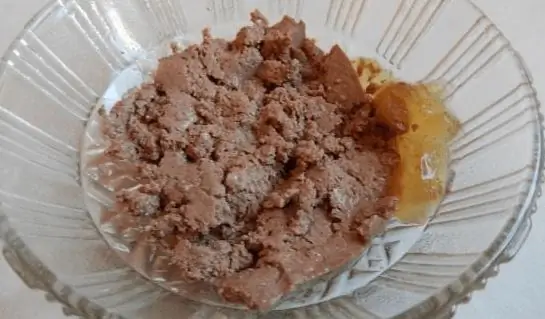
Due to the lack of meat fibers, useful substances from the pate are absorbed worse
With a systematic diet of pies and mashed potatoes, the stomach weaned from solid food. Due to the lack of fibers, the walls of the gastrointestinal tract are less well cleaned of rotting food debris. However, pates are well suited for unhealthy animals with intestinal diseases: they act as a gentle diet. Also, the feed can be used in the postoperative period to prevent trauma to the internal mucous membranes.
Feed classification
Feed is divided into the following classes:
- economy;
- premium;
- super premium;
- holistic.
The categories are arranged in order of quality improvement from top to bottom.
Economy class
Economy-class forages conditionally satisfy the daily requirement for nutrients, however, as a result of the use of low-quality sources of nutrients in animals, a deficiency of individual compounds occurs. This contributes to a gradual deterioration in health and the development of pathologies of internal organs.
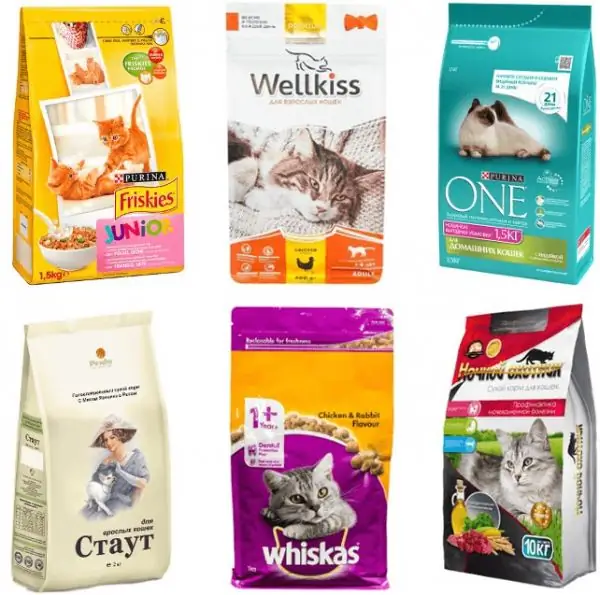
Aggressive advertising and affordability are common features of budget feeds, so many brands are easy to recognize
Low-cost products are distinguished by almost complete absence of meat in the composition. In the dry residue, it is only 1-4% of the total share. The bulk of proteins and fats are provided by plant components. In the case of economy class, these are cereals. They are poorly absorbed by predators. In addition, corn, wheat and soybeans, which are mostly used due to their cheapness, can cause allergies.
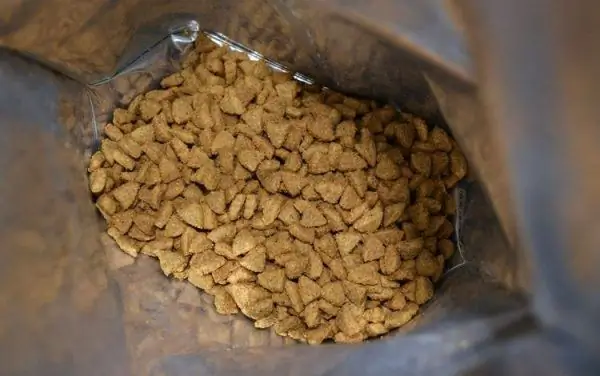
Budget food pellets are very light, indicating an excess of cereals and a lack of meat
When my second cat came to me, she ate only economy class wet food. She preferred "Whiskas", "Friskis", "Felix", etc. The former owner said that the cat refuses other food. This is a typical situation for this product category. Although the manufacturers claim that they do not add synthetic ingredients to enhance the flavor, this raises doubts. The cat was allergic. Her eyes were flowing, her hair fell out, and blood sometimes appeared in her feces. With difficulty, I transferred it to the feed of the holistic category. After that, the condition gradually improved.
Premium class
The premium class is better than budget feed, but it is still not suitable for regular meals. This is due to the poor composition. The share of meat has increased to 10-20%, but this is far from the benchmark (70-90%). The disadvantages of the premium class are the same: with prolonged feeding, metabolic disorders and generalized pathologies of internal organs appear in animals.
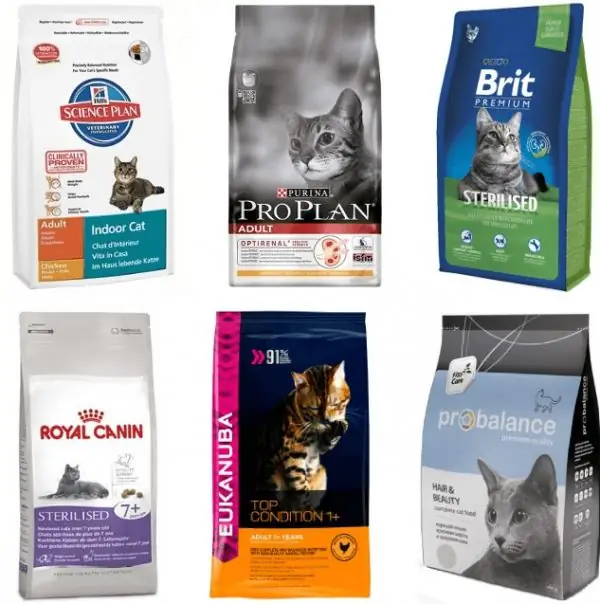
Premium food is presented by marketers as elite, which has led to massive popularization
The composition includes potentially hazardous components. For example, allergens, flavor enhancers and not the most harmless preservatives. Structural components are often added to wet food. Thickeners help to achieve a jelly consistency, but can irritate the mucous membranes of the digestive tract.
Super premium class
The super premium is much better than the premium and economy categories. These feeds can already be used for systematic nutrition, since they contain up to 50% of meat components. The ingredients that manufacturers include in the composition are of higher quality. If it is meat, then add carcasses, pure flesh or by-products such as liver, heart, kidney, lungs, etc. Companies are clarifying the type of plant components. The latter are used not as a filler, but to normalize digestion, provide the body with fiber, prevent the development of urolithiasis, etc.
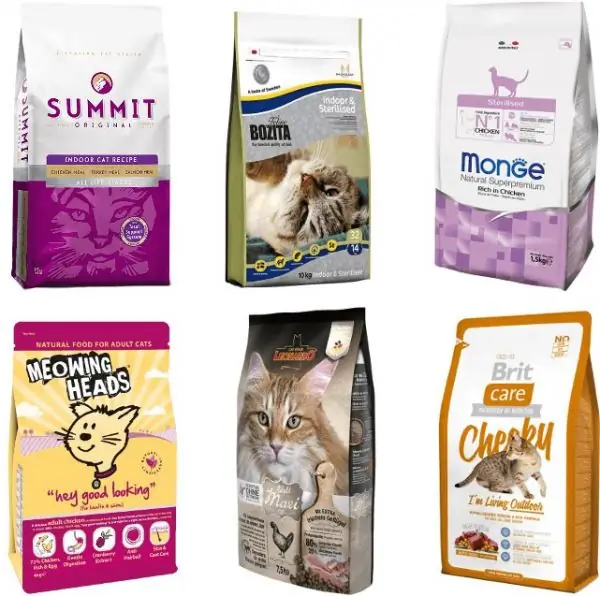
High-quality feed extremely rarely gets on advertising stands and TV screens, so even the most caring pet owners do not know about the existence of most brands
The disadvantages of the super-premium class include the high cost. The average price of 1 kg of such feed is 500-700 rubles. If you buy products in small packages, the cost will be higher.
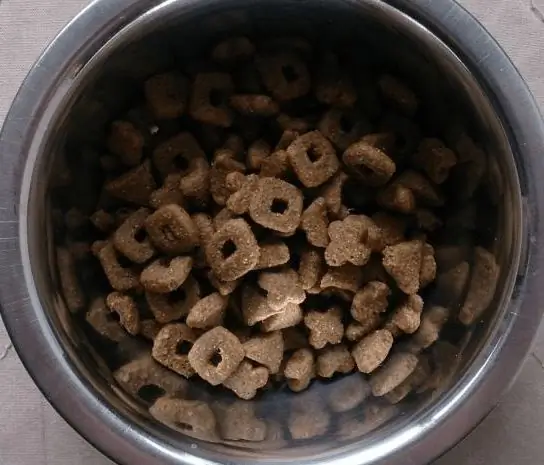
Compared to economy and premium feeds, the pellets of super premium diets are darker, but the lack of meat is still evident
Although the super-premium class is inferior to the holistic category, many pet owners stop at it. It's not about the price: the cost of representatives of these two categories is about the same. If a pet has been eating economy or premium food since childhood, its gastrointestinal tract has already adapted to the digestion of cereals and low-quality plant extracts. With a sharp transition to elite feed, new chronic diseases may arise. An exacerbation of existing pathologies is possible. Animals do not always end up getting used to high-quality feed. A similar thing happened with my friend. His cat was plagued by nausea and indigestion. The super premium class has become an intermediary in translation.
Holistic class
Holistic-class is the elite of the cat food. They are most consistent with the natural needs of predators, as they mainly consist of meat. A distinctive feature of such products is a detailed indication of the composition. The manufacturer not only reports the proportions and amounts of key nutrients, but also notes the type of ingredients. Many holistic foods contain several types of meat. They rarely contain cereals and cheap plant components. They are not found as cheap fillers, but as natural sources of vitamins, minerals, and coarse fiber.
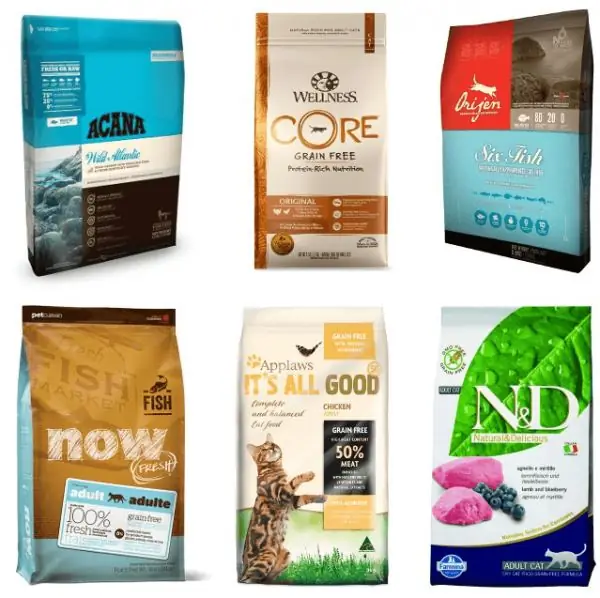
Holistic-class food is rarely found even in pet stores: it is unprofitable to purchase them due to the high cost and low demand
In some cases, holistic-class feeds can be used instead of prophylactic products. Most often, their composition already includes additives that improve digestion, protect joints from mechanical damage and prevent the development of urolithiasis. In most cases, the line includes only 2-4 formulations. More and not needed: diets that meet biological needs are suitable for animals of almost all ages and prevent the development of diseases.
Types of food depending on the age of the animal
In most rulers of holistic classes, there is no division into age categories of animals. In the case of the super-premium category, this is common, but rare. Low-quality brands are more likely to produce products for animals of different ages, since good food is suitable for all healthy pets. Traditionally, manufacturers have developed formulations for kittens, adult cats, and senior pets.
Food for kittens
Kittens need more calories and nutrients (vitamins, minerals and amino acids) as their internal organs and systems are actively developing. Useful compounds are used as building materials for fabrics. If an adult animal can tolerate a deficiency of nutrients for a long time without critical consequences, then in the case of kittens, even 5-7 days at an early age (1-2 months) can cause the development of chronic diseases.
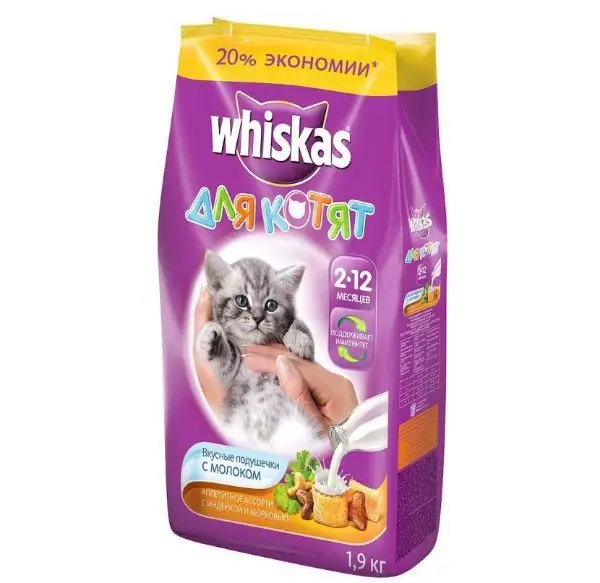
Despite the assurances of the manufacturer, it is better not to give Whiskas food to kittens: such food will lead to the development of pathologies even at the time of the final formation of internal organs
Fish oil, salmon oil, and tocopherols in high concentrations are often included in kitten foods. Unsaturated fatty acids and vitamin E help to improve immunity and the state of the nervous system. Some manufacturers use dairy products and extracts as a substitute for breast milk. They partially supply the kitten's body with antibodies.
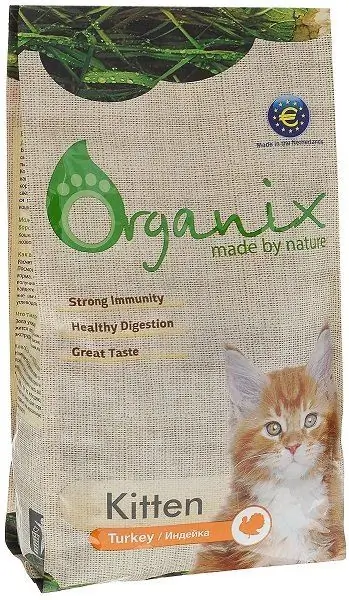
The “Kitten” mark may indicate that the food is suitable for kittens
For small kittens, wet food is preferable. It is close in consistency to regular food, so the gastrointestinal tract adapts gradually. It is also allowed to give dry food to kittens after a month, but it is recommended to soak it first.
Food for adult cats
Food for adult cats are universal standard products that differ in the average concentration of nutrients and the usual calorie content. These diets are suitable for almost all animals without special needs. They can be given even to older pets in the absence of overweight problems, if they contain preventive supplements.
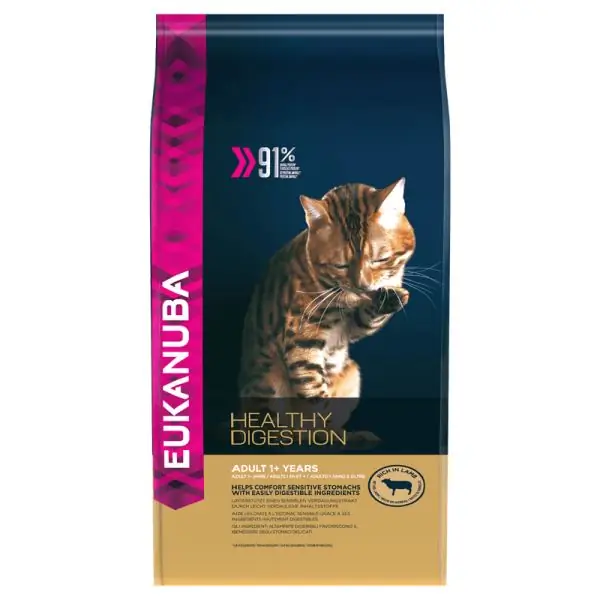
The label "Adult" indicates that the food is suitable for adult cats
Food for senior cats
Manufacturers recommend feeding older cats from the age of 7, but in reality, with good care and good health, the animal may need a diet only after 10-12 years. Most often in such diets calorie content is reduced by reducing the proportion of fat. This helps to simultaneously reduce the burden on the liver and prevent excess weight.
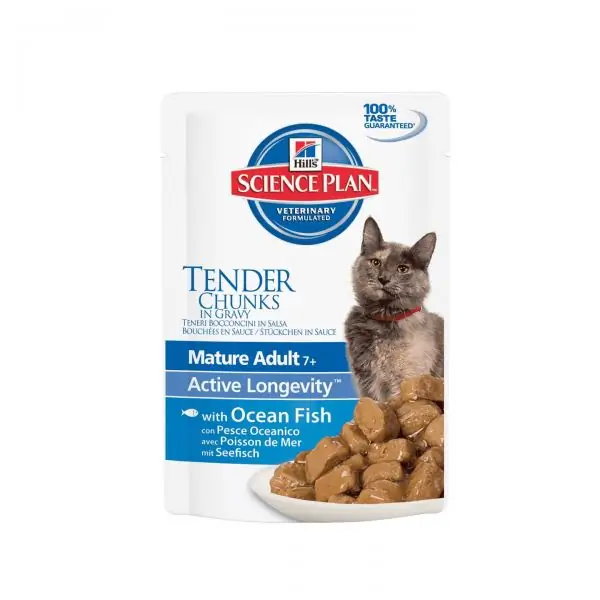
Manufacturers can indicate recommended age limits on packages
Obesity is common in older cats due to decreased activity. Excess weight at this age is a big threat, since it is fraught with increased stress on the joints. In old age, problems with the musculoskeletal system often appear. To prevent damage to cartilage and joints, manufacturers include sources of glucosamine and chondroitin in the feed: cartilage, mussel extract, crab shells, etc. However, diets with such additives are recommended to be given to young cats, since they may not help at an older age.
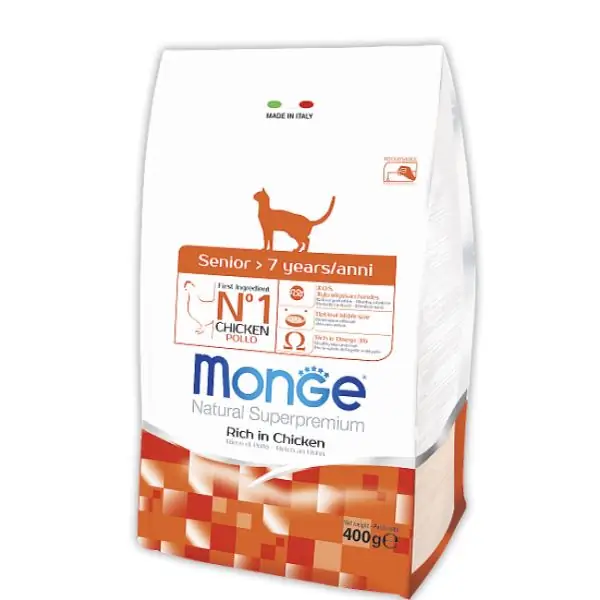
The label "Senior" may indicate that food is suitable for older cats.
For older cats, like kittens, it is advisable to give wet food in the presence of chronic diseases. This will reduce the severity of symptoms in pathologies of the gastrointestinal tract and oral cavity. In such cases, spiders are combined with dry food, but they are given at different times so as not to provoke indigestion.
Preventive prepared feed
Prophylactic ready-made feeds are most commonly found in super premium lines and below. Holistic by themselves contain medicinal additives and prevent the development of diseases with special needs.
Most often, the following feeds are present in the lines:
-
For neutered and neutered animals. Products should prevent obesity and the development of urolithiasis. To fulfill the first condition, the calorie content is reduced to 340-360 kcal per 100 g. This is enough to maintain a stable body weight. To prevent the development of ICD, the proportion of minerals is reduced, salt is removed from the composition and preventive additives are added to increase urination frequency and control acidity levels. For example, cranberries are often used. Wet food for neutered cats is often produced. They prevent mineral overload in urine.

Friskies for neutered cats Prophylactic food Friskies is the very case when the medicine is worse than the disease: often it becomes the cause of the development of not only the ICD, but also pathologies of the pancreas and liver
-
For pets prone to allergies. Cereals are excluded from the composition. Rice may be left in low-quality foods because it is almost gluten-free and rarely causes allergies. In elite products, the list of ingredients includes only fruits and vegetables in small quantities, as well as meat. The exclusion of poultry protein (including eggs) is encouraged as it causes unwanted reactions relatively frequently. For hypoallergenic feed, a short composition is desirable.

Orijen dry food with fish Fish food can be a good option for allergies: they do not contain the usual sources of animal proteins for a cat.
-
For pregnant and lactating cats. The calorie content of such feed and the saturation of vitamins and minerals are increased compared to standard rations. This helps to maintain the proper development of kittens and prevents deterioration of the cat's health. Calcium deficiency is most dangerous for animals. In a cat, it can cause rapid death after childbirth.

Royal Canin dry food for kittens and cats Despite not the best composition, Royal Canin feeds do their job well and do not allow micronutrient deficiencies
-
To normalize digestion. Such feeds are distinguished by the presence of plant fibers, as well as pre- and prebiotics in the composition. The latter normalize microflora and strengthen local immunity. Plant fibers improve peristalsis and cleanse the intestinal walls.

Dry food Grandorf for cats with sensitive digestion Dry food Grandorf solves several problems at once: the main source of protein is white fish, which rarely causes allergies in cats, and a complex of probiotics normalizes digestion
-
To remove wool from the digestive tract. These products are characterized by a high content of plant fibers. Fiber helps trap and pull hairs out before they become clumps. In addition, the presence of fish oil and an increased concentration of tocopherols is desirable: this will reduce hair loss.

Friskies dry food for hairball control Friskies dry food really does its job due to the abundance of plant fibers in the composition, but at the same time worsens the overall well-being of the animal
-
For cleaning teeth. The composition of the feed may practically not differ from similar products. Manufacturers sometimes add cellulose for mechanical cleansing and mint and tea tree extracts to kill bacteria and remove bad odor from the mouth. The main difference lies in the structure of the granules. When bitten, they fall inward, which provides cleaning of the entire surface of the canines.

Hill's Dry Teeth Cleanser In case of problems with the oral cavity, you can give the cat special food in courses, but it is better to prefer a brush: the composition of most diets is not of the highest quality
Medicinal ready-made feed
Medicated foods are intended for cats with pre-existing health problems. They are distinguished by a low content of amino acids and some vitamins and minerals, depending on the nature of the pathology and the presence of prophylactic additives.
In the lines of the holistic category, there are no such products, since it is assumed that with proper nutrition, animals do not get sick. In case of diseases, elite food is not always allowed to be included in the diet, therefore, before adjusting the diet, it is necessary to consult a doctor.
Most often, manufacturers offer products to alleviate the condition for the following diseases:
-
Diabetes. Standard grains are replaced with slow carbohydrate sources. For example, oats. This helps to better control blood sugar levels.

Royal Canin dry food for cats with diabetes Royal Canin Dry Food is not very well formulated, but does help stabilize glucose levels
-
Urolithiasis disease. The food contains additives to normalize urine acidity. In general, the composition of the product resembles the diets for sterilized animals, but the proportion of minerals is reduced even more, since the pet already has a tendency to form calculi.

Cat food to prevent struvite formation When choosing a feed, it is necessary to know the type of stones formed, since the optimal acidity of urine and the balance of minerals depend on this
-
Renal failure In most cases, feeds are low in protein. This factor is considered controversial. Some scientists believe that such a measure not only does not help predators, but also harms: the pet does not receive enough amino acids for normal metabolism, suppression of inflammation and tissue repair.

Royal Canin Renal food Royal Canin Renal wet food is considered the best in the treatment of kidney failure
-
Liver pathology. The feed contains less certain minerals (eg copper) and fat. This reduces the burden on the liver.

Dry food Royal Canin Hepatic The diet itself does not relieve the pet of the disease, but it alleviates the condition and increases the effectiveness of treatment
-
Digestive disorders. Depending on the nature of the deviation, the feed can either contain more plant fibers to stimulate intestinal peristalsis, or have the most delicate composition. Wet foods are more consistent with the latter requirement. Flaxseed, aloe, and other supplements are sometimes added to diets to prevent mucous membrane damage.

Royal Canin Fiber Response dry food Royal Canin Fiber Response dry food will gently relieve constipation: fiber fibers facilitate the movement of feces through the intestines
-
Joint pathologies. The food is characterized by a reduced calorie content for the prevention of obesity and the presence of glucosamine and chondroitin in the composition. The latter contribute to the restoration of cartilage tissue and the release of lubricant, which prevents damage to joints during movement.

Acana dry food Almost any holistic class food can help in the treatment of joints; for example, Acana contains dried lamb cartilage
Since medicated feeds most often do not meet the daily requirement for most nutrients, it is recommended to give them to your pet in courses. With a constant diet of specialized foods, a deficiency of certain nutrients can occur. As a result, this leads to a deterioration in the condition of other organs.
Other types of feed
The main varieties include special cat milk replacers for kittens. They are suitable for newborn pets and can save their lives if the cat abandons them or died during childbirth. The substitute is better than standard cow's milk because it has an adapted composition and contains less sugar. The latter are capable of causing indigestion, diarrhea and rapid death in kittens due to rapid dehydration.
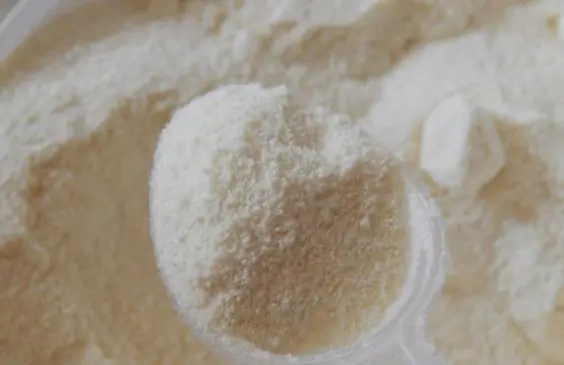
Cat milk replacers are a powder that must be diluted with liquid before use
The varieties of wet food include pieces in jelly, sauce, with creamy gravies, etc. Most often, manufacturers of low-cost products add a variety of gravies. The composition of the feed practically does not differ, therefore, when choosing, one should be guided only by the preferences of the animal. However, it is advisable to abandon such diets altogether: economy-class products inevitably worsen the health of pets.
Combo foods are sometimes found: pellets with soft chews, filled pads, moist rations with crunchy toppings, etc. These foods should be avoided. Due to the heterogeneous consistency, the animal may experience digestive upset. Most often, such products belong to the economy category, and the unusual texture helps to attract the attention of buyers, but in no way helps to improve the appetite of pets.
There is a wide variety of incomplete feeds. The line includes dehydrated fillet pieces, biscuits from meat, liver and cereals, lamb light, etc. Such products are used only as treats.
Ready-made cat food differ in the content of nutrients, quality class, purpose, etc. Products are divided into daily, preventive and therapeutic. It is important to choose the food that is right for your pet and will not provoke a deterioration in health. This can only be done by the owner himself or the veterinarian after the examination, since it is necessary to take into account individual characteristics and needs.
Recommended:
The Better To Feed A Kitten: Natural Food, Ready-made Dry And Wet Food, What Foods You Can And Cannot, Feeding Rules, How Many Times A Day
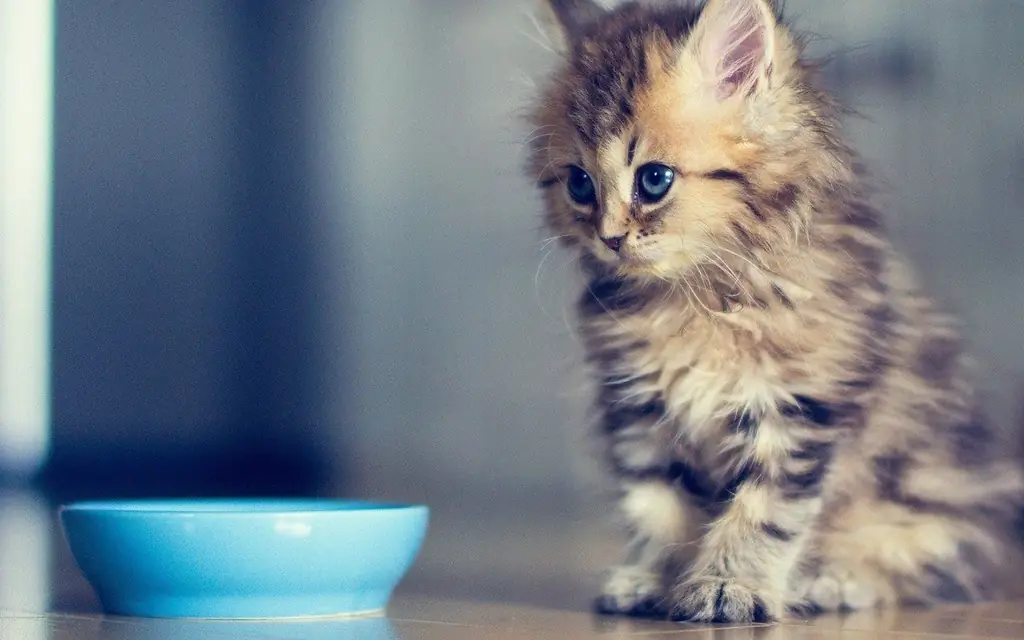
Kitten feeding rules. Veterinarian recommendations. Features for every age. Prohibited and permitted products, prepared feed. Feed reviews
Analysis Of Cat Food: Comparison Of Their Composition, From Which Dry And Wet Food Is Made, Analyzer Of Components (ash, Preservatives, Etc.)
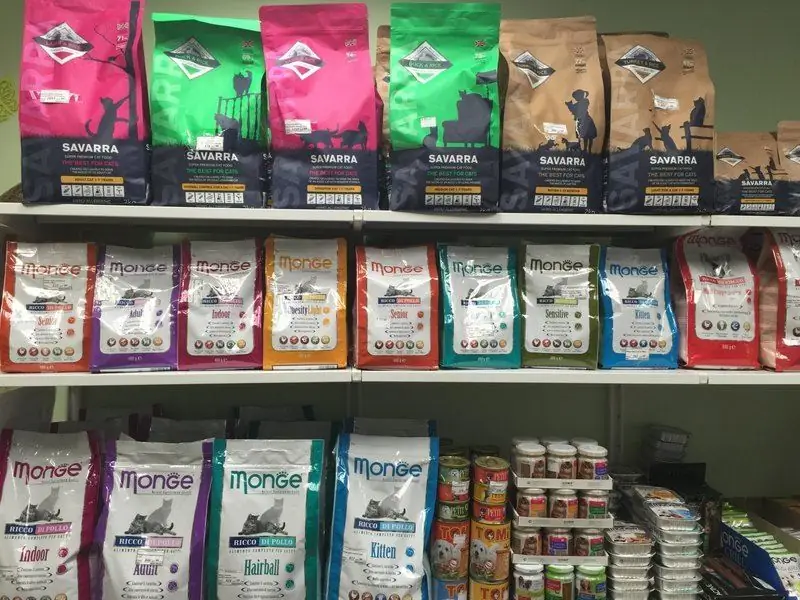
What ingredients should be present in cat food and what ingredients should be avoided. How diets differ from each other
Is It Possible To Soak Dry Food For Cats And Cats: Features Of Soaking For Adult Animals And Kittens, Recommendations Of Veterinarians
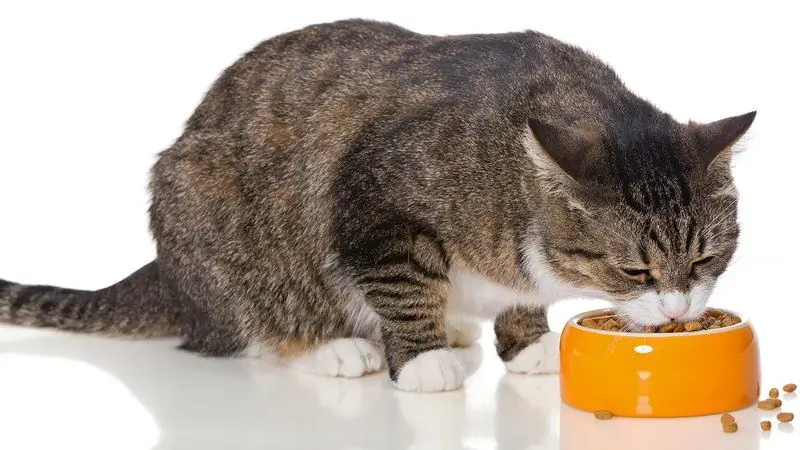
Is it possible and when it is necessary to soak dry food for cats and kittens, how to do it correctly, is it possible to store soaked food. Veterinarian recommendations
What Food To Feed The Maine Coon (adult Cat And Kitten): Dry And Wet Food, Recommendations, Permitted And Prohibited Foods
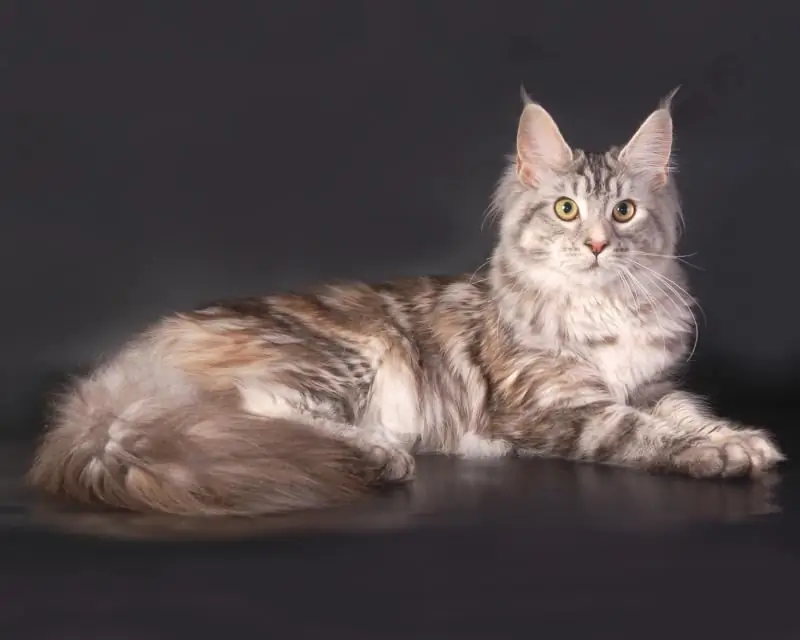
How to feed a kitten and an adult Maine Coon cat. What products are allowed to be given to animals. How to choose dry food for Maine Coon
Deprive Cats And Cats (shearing And Other Species): What It Looks Like, Signs, Treatment Of Kittens And Adult Animals At Home, Photo
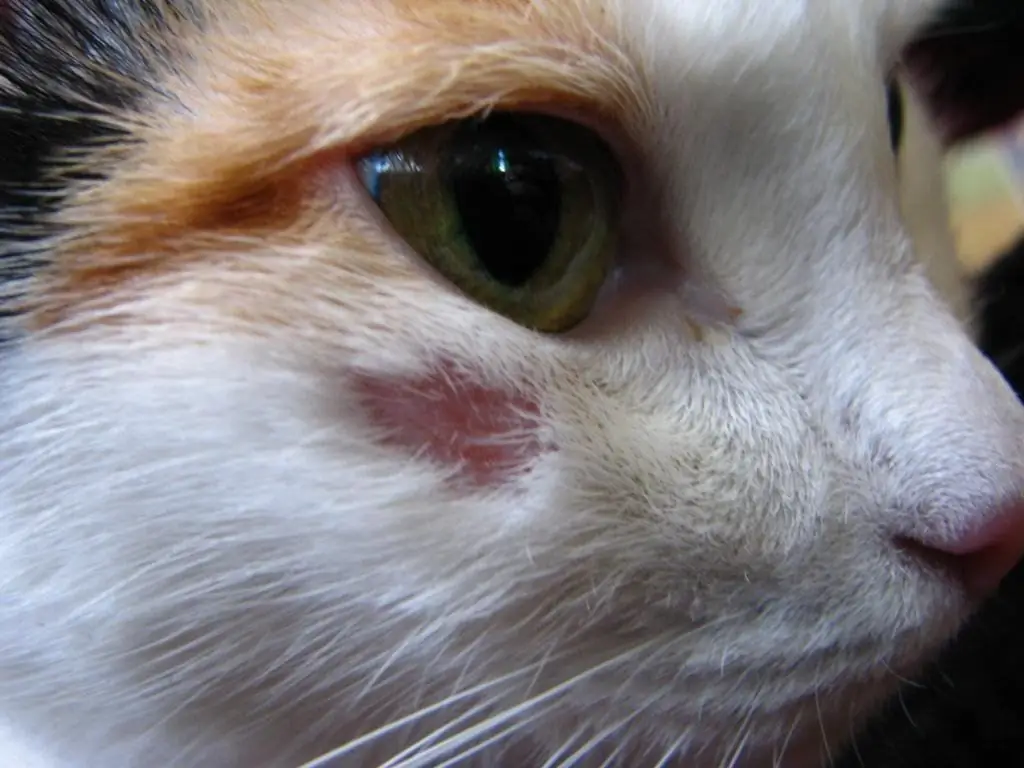
How does shingle manifest in cats? The causative agent and types of the disease. Features of the course of the disease. Treatment methods and prognosis. Deprivation prevention. Reviews
